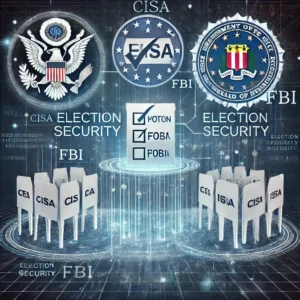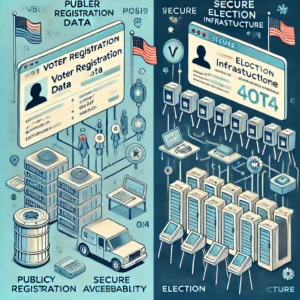In recent years, U.S. election integrity has come under unprecedented scrutiny, fueled by misinformation and false claims of hacked voter information. While voter confidence is essential to a healthy democracy, bad actors have sought to undermine this trust by spreading disinformation. A recent joint statement from the Federal Bureau of Investigation (FBI) and the Cybersecurity and Infrastructure Security Agency (CISA) highlights how these false claims are deliberately used to sow distrust in U.S. elections.
The False Claims of Hacked Voter Information and Their Origins
The spread of false claims of hacked voter information is part of a broader effort to manipulate public opinion. In many cases, malicious actors use the existence of voter registration information as “proof” that U.S. election systems have been compromised. However, as both the FBI and CISA have made clear, the presence of publicly available voter registration data is not an indicator of election interference.
Most voter registration data, such as names, addresses, and voting history, is publicly available and can be legally obtained. Therefore, when cybercriminals claim to have “hacked” voter data, they are often misleading the public by using readily accessible information that does not indicate a breach in security.
Why Publicly Available Voter Information Matters
It’s essential to understand that just because voter registration data may be available does not mean that the election infrastructure itself has been compromised. In fact, in the last several election cycles, cyber actors who managed to acquire voter information did so without affecting the election process.
Voter registration databases, while containing essential information, are part of a much larger and more robust system designed to protect the integrity of elections. Importantly, the voting process, including the counting of ballots, remains secure.
Debunking Myths: No Evidence of Election Interference
As of the latest information provided by the FBI and CISA, there is no evidence to suggest that any cyberattacks have compromised U.S. election infrastructure. They emphasize that no attacks have prevented elections from taking place, altered voter registration data, interfered with ballot casting, or affected the tallying of votes.
This clarity is critical in a climate where social media posts, emails, and other digital communications are used to spread false information. The public is advised to critically evaluate claims of “hacked” or “leaked” voter data and recognize that these claims are often intended to undermine trust in U.S. democratic institutions.

How the FBI and CISA Work to Protect U.S. Elections
The FBI and CISA play a crucial role in safeguarding U.S. election integrity by closely working with federal, state, and local election officials. The FBI investigates and prosecutes election-related crimes, including foreign influence operations and cyberattacks targeting election infrastructure.
Meanwhile, CISA provides essential resources to election officials, helping them fortify election processes against cyber, physical, and operational threats. Their collaboration ensures that U.S. elections remain resilient against emerging threats and disinformation campaigns.
How You Can Stay Informed and Protect Democracy
To combat the impact of disinformation, it’s important for the public to stay informed through reliable sources. Here are some recommendations from the FBI and CISA:
- Be cautious of disinformation: Be skeptical of social media posts, unsolicited emails, or phone calls making suspicious claims about election security. Misinformation can spread rapidly, especially during election cycles.
- Rely on official sources: Always verify election-related information from trusted sources, such as state and local government election offices. Many of these offices use “.gov” domains, signaling that they are legitimate.
- Report suspicious activity: If you encounter suspicious or criminal activity, such as ransomware attacks or other cyber incidents, report them to the FBI’s Internet Crime Complaint Center (IC3) or contact CISA.
Reporting Suspicious Activity
Both the FBI and CISA have made it easy for citizens to report cyber incidents or election-related disinformation. Here’s how:
- Report incidents to the FBI Internet Crime Complaint Center (IC3).
- Reach CISA by calling 1-844-Say-CISA (1-844-729-2472), emailing report@dhs.cisa.gov, or visiting cisa.gov/report.
By reporting suspicious activities, the public can help ensure the security of U.S. elections and protect democracy from the threats of cyberattacks and disinformation.
Final Thoughts: The Importance of Vigilance
While malicious actors continue to push false claims of hacked voter information and other forms of election interference, it’s vital to stay vigilant and informed. U.S. election infrastructure is designed to withstand threats, and both the FBI and CISA are dedicated to ensuring its security. By critically evaluating information and relying on trustworthy sources, citizens can play a pivotal role in safeguarding the integrity of democratic processes.
The spread of disinformation is not just an attack on the election process itself but on the public’s trust. Staying informed and reporting suspicious activity ensures that we can collectively protect the very foundations of democracy.
